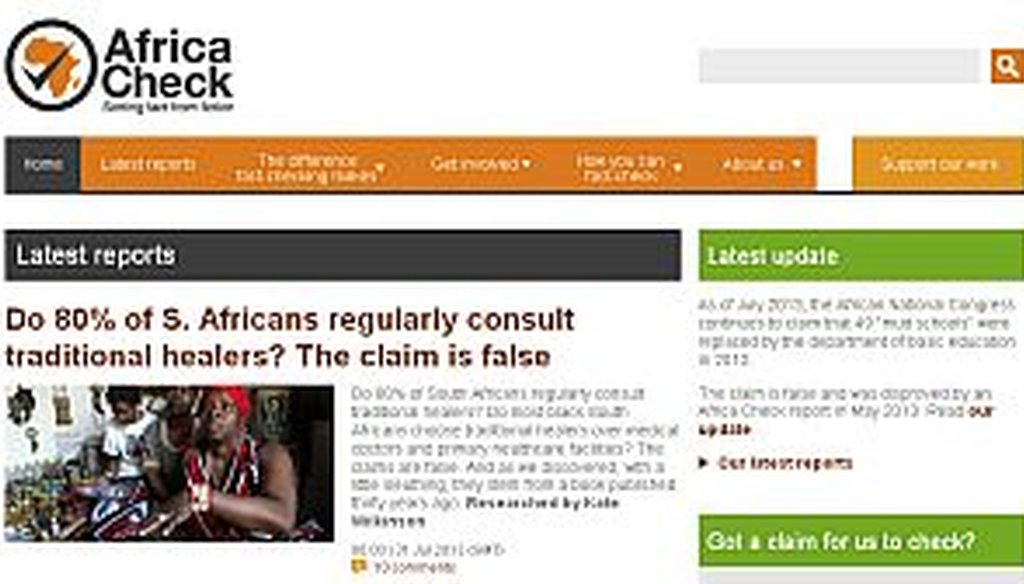Stand up for the facts!
Our only agenda is to publish the truth so you can be an informed participant in democracy.
We need your help.
I would like to contribute

A group of journalists in South Africa recently started the website Africa Check.
No matter what continent you’re on, there’s likely a new fact-checking venture nearby. Inspired by PolitiFact and other fact-checking sites, journalists from South Africa to Chile to Australia have launched initiatives to check the truthfulness of local politicians’ claims.
Even before the new crop of sites sprang up this year, fact-checking had spread beyond the borders of the United States. The new ventures join sites in France, Norway and Sweden.
Journalists around the world are attracted to fact-checking because holding public officials accountable is a core part of their professional responsibilities, said Brendan Nyhan, a professor at Dartmouth College who studies political misperceptions. "Also, it's an interesting new form of journalism that differs from the news-driven reporting model," he said.
In France, the popular blog "Les Decodeurs" was created in 2009 by the newspaper Le Monde. Les Decodeurs — like other French fact-checking sites — began to seriously gain traction during the country’s most recent presidential election in 2012.
Though some of the newer fact-checking sites follow the model of PolitiFact and Les Decodeurs, and have been created by traditional media outlets, others have sprung up as independent ventures.
Last year, for instance, a group of young Italian journalists started Pagella Politica. The site ranks politicians’ statements on a scale ranging from true to "panzana pazzesca" — their equivalent of "Pants on Fire." They also compute each politician’s relative truthfulness and give them a percentage-based grade. After checking more than 500 statements in their first four months, Pagella Politica successfully crowd-sourced funding to revamp their site.
Germany has enjoyed a boom in fact-checking as its September presidential election draws nearer. In May, the magazine of the German newspaper Die Zeit started Faktomat, an interactive site where readers can suggest politicians’ statements, debate their veracity and vote on which should be checked.
"Our newsroom cannot have its eyes and ears on politicians at every talk show, every interview, campaign event, speech or radio program. But our readers can, so they suggest which politicians’ claims to check," Faktomat investigative editor Martin Kotynek said. "Afterwards, everyone can ‘up-’ and ‘down-vote’ these claims — much as users do on Reddit."
Popular claims then get checked by the magazine’s staff and receive a rating of true, false or half-true. German magazine Der Spiegel also started a fact-checking resource for the upcoming election called Munchausen-Check, which has a six-point scale for truthfulness.
Here at PolitiFact, we recently launched our first international affiliate: PolitiFact Australia. An independent venture run by Peter Fray, the former editor in chief of the Sydney Morning Herald, PolitiFact Australia has partnered with several other media companies to provide fact-checking in the lead-up to Australia’s national elections in September.
Joining PolitiFact Australia will be fact-checking features from the Australian Broadcasting Corporation; online Australian magazine Crikey; and The Conversation, a website of university professors.
Chilean newspaper El Mercurio launched a fact-checking feature after spending several days observing the PolitiFact staff. Though El Mercurio’s "El Poligrafo" and its flip-meter "Vuelto de Carnero" are not directly affiliated with PolitiFact, they rely largely on our methodology, if not the specific ratings and terminology. El Mercurio published its first El Poligrafo feature last month.
Back across the Atlantic, a group of journalists in South Africa started Africa Check last year after winning a contest sponsored by Google. A relatively small organization for now, Africa Check partners with the University of Witwatersrand in South Africa and is sponsored in part by the Agence France Presse Foundation. Though they face a number of issues we at PolitiFact do not have to contend with — a frequent lack of reliable government statistics, for one — Africa Check hopes to continue the spread of fact-checking and eventually expand into neighboring countries.
"It’s hard to think of any other new idea in journalism that has spread this quickly around the world," said Lucas Graves, a journalism professor at the University of Wisconsin who studies fact-checking. "Even the news interview — the idea that you would interview a source and print their quotes in the paper — had to be invented in the second half of the 1800s. … That took half a century to spread to the rest of the world."
Our Sources
The Economist. "Italian politics: Pinocchio’s heirs." Feb. 22, 2013.
France 24. "Fact-checking blogs turn up heat on French candidates." June 3, 2012.
The Guardian. "Are fact-checking sites a symptom of the media not doing its job?" July 15, 2013.
Faktomat. "Übersicht." Accessed Aug. 5, 2013.
ZEITMagazin. "Pruft die Politiker!" May 8, 2013.
The New York Times. "Nonpartisan Fact-Checking Comes to South Africa." July 23, 2013.
Le Monde. "Les Decodeurs."
The Australian. "Russell Skelton to head ABC fact-checking unit." May 22, 2013.
Columbia Journalism Review. "Factchecking enters ‘Conversation’ in Oz." July 31, 2013.
PolitiFact. "PolitiFact expands to Australia." May 12, 2013.
Interview with Lucas Graves, journalism and mass communication professor at University of Wisconsin. Aug. 9, 2013.
Email interview with Martin Kotynek, investigative editor with Die Zeit. Aug. 5, 2013.
Email interview with Brendan Nyhan, government professor at Dartmouth College. Aug 9, 2013.























